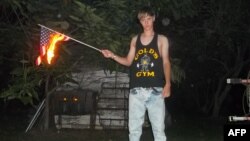The man charged in the shooting deaths of nine African-American churchgoers in Charleston, South Carolina, has been indicted on federal hate crime charges.
U.S. Attorney General Loretta Lynch announced Wednesday that a federal grand jury had indicted Dylann Roof, 21, on 33 charges "for killing and attempting to kill African-American parishioners ... because of their race and in order to interfere with their exercise of their religion."
Federal charges have been expected since Roof was arrested in North Carolina a day after the June 17 shootings. He is alleged to have joined an evening Bible study class at Emanuel African Methodist Episcopal Church in Charleston, then shot nine participants with a .45-caliber Glock handgun.
The victims included Emanuel's chief pastor, Clementa Pinckney, who was also a South Carolina state senator. Three people survived the shooting.
A website attributed to Roof, who is white, was later found to contain racist views toward blacks. He also appeared in photos waving Civil War-era Confederate flags, and survivors said he made racist remarks during the attack.
"We think that this is exactly the type of case ... that the hate crime statutes were in fact conceived of to cover," Lynch said. "Racially-motivated violence such as this is the original domestic terrorism."
Lynch said the U.S. government was charging Roof with nine murders and three attempted murders under a hate crime law that prohibits the use of force to harm an individual on the basis of race or color.
He is also charged under a second hate crime law that bans the use of force to prohibit the free exercise of religious belief, the attorney general said.
"Finally, Roof has been charged with the act of using a firearm in these racially motivated murders and attempted murders," she said.
State charges
The federal counts are in addition to state murder and attempted murder charges. South Carolina has no hate crime laws on its books, but the murder charges it is pressing against Roof carry the possibility of the death penalty.
Lynch said no decision had yet been made about whether to seek the death penalty. Consultation with the victims' families will be "an important part of this decision-making process," she said. Roof could also face life in prison if convicted.
Hate crime cases are often challenging for the government because it must prove that a defendant was primarily motivated by a victim's race or religion as opposed to other factors frequently invoked by defense attorneys, such as drug addiction or mental illness.
Last year, a federal appeals court in Ohio overturned hate crime convictions against Amish men and women accused in beard- and hair-cutting attacks against fellow Amish who were thought to have defied the community leader.
The court held that the jury had received incorrect instructions about how to weigh the role of religion in the attacks and that prosecutors should have had to prove that the assaults wouldn't have happened but for religious motives.
Some information for this report came from AP and AFP.





